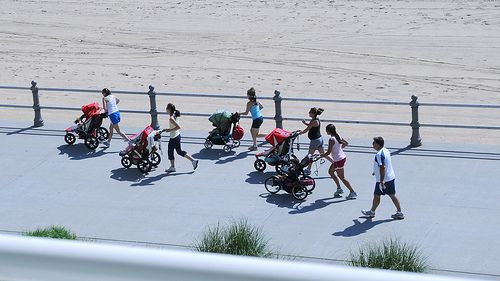Exercise During Pregnancy Could Improve Vascular Health In Offspring Through Adulthood

One of the key maxims of pregnancy is that a woman is now “eating for two.” According to a new study, the sentiment should be expanded to include exercising for two, as scientists have found that a woman who exercises during pregnancy may benefit her offspring’s vascular health through adulthood.
The Centers for Disease Control and Prevention recommend adults between 18 and 64 receive 150 minutes of cumulative moderate-intensity exercise each week. With that knowledge, researchers from California State University San Marcos and Universitätsmedizin Greifswald in Germany performed the first-ever analysis of maternal exercise and offspring health. Their results may help newly pregnant mothers make more informed decisions during gestation.
Published in the journal Experimental Physiology, the study involved pigs instead of traditional rodents. Swine respond better to exercise regimens than rats or mice, and provide a better comparison to humans when it comes to physical activity responses, without the ethical burdens of long-term studies that use humans themselves. Researchers had the animals run on a treadmill for 20-45 minutes five times a week, “which is consistent with American Congress of Obstetricians and Gynecologists (ACOG) recommendations,” according to researchers Dr. Sean Newcomber and Dr. Martin Bahls.
“We assessed vascular function in offspring femoral arteries using in vitro techniques,” they added in a statement, ultimately finding the greatest impact on the vascular smooth muscle — a type of smooth muscle running along the inside of the blood vessel wall.
The study is the first of its kind to examine offspring outcome into adulthood; prior studies have ceased observation in adolescence. The present study has also overturned a once-believed notion that fetal programming could intervene with the single-cell layer lining the blood vessels, called the endothelium, and disrupt physical activity’s impact on the vascular smooth muscle.
Admittedly, exercise during pregnancy is still something of a hot-button issue for doctors, as a general consensus has yet to be reached whether the increased physical stress does more harm than good for a developing fetus. The expert Advisory Board for the Baby Center lists weight training as a “great pregnancy exercise,” encouraging women to lift weights with moderate intensity in the first trimester, then scale back the workouts as the pregnancy progresses.
"We are only starting to understand how exercise during gestation influences offspring adult health and disease,” the researchers explained. “Results like ours may help to create guidelines enabling women to make the best decisions for them and their children by providing evidence based health choices.”
Further research, the team argued, was needed primarily as a screening tool for cardiovascular diseases among newborns as they age through life. The transference of vascular health from mother to offspring suggests a link that could in fact work in the opposite direction — particularly in reference to the well-known dangers of inhaling tobacco smoke during pregnancy.
"Physical activity may act through multiple pathways which depend on type, duration, intensity and frequency of the exercise regimen,” the team said. “Furthermore, it is essential that future research investigates the coronary circulation and also establishes what impact these reported changes in vascular function in the offspring have on cardiovascular disease susceptibility."
Published by Medicaldaily.com



























